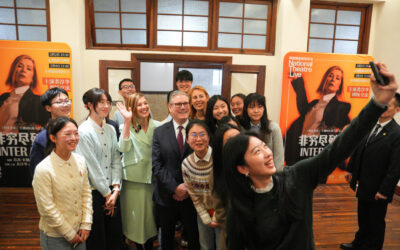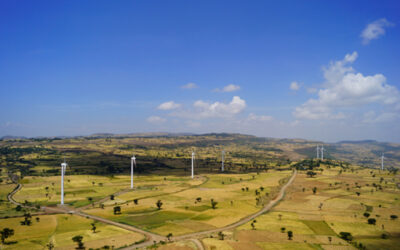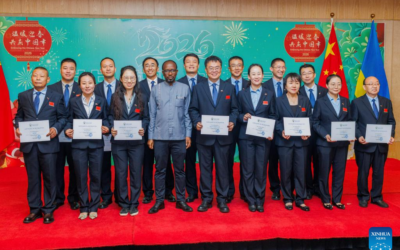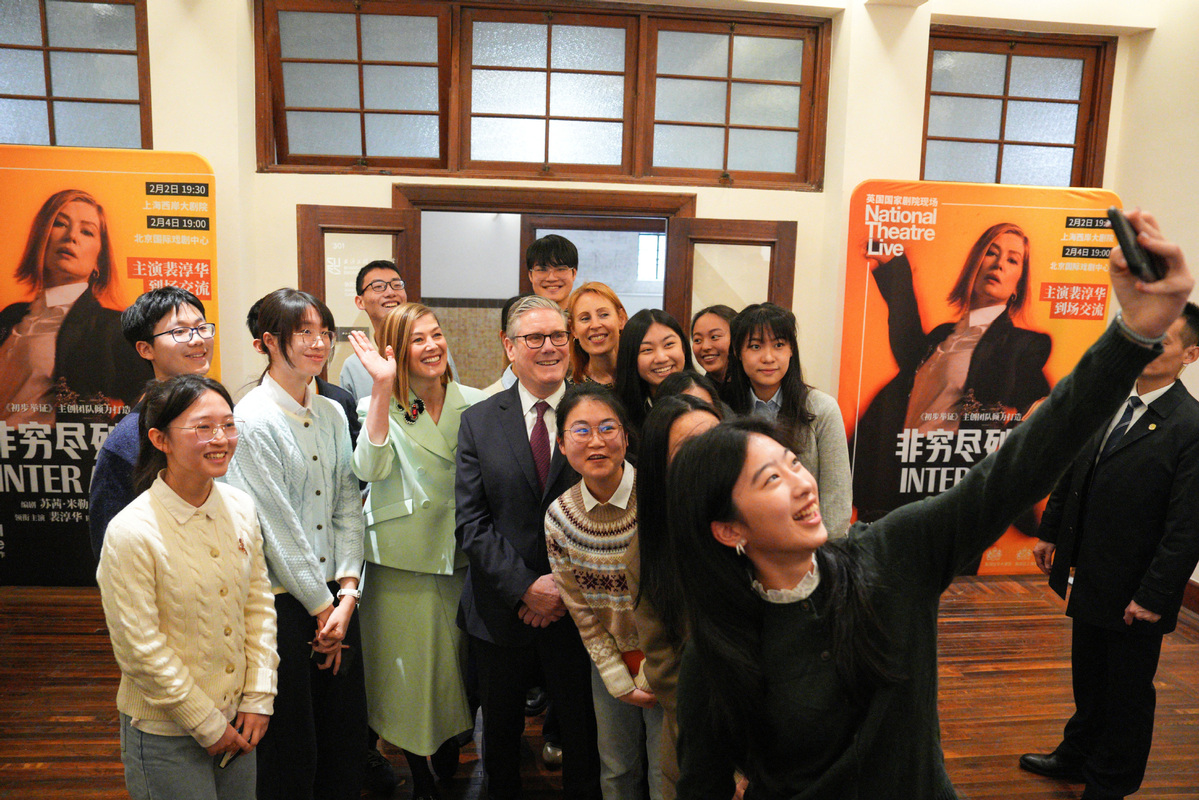Street banners for the Global Leaders’ Meeting on Women are pictured in Beijing, capital of China, on Oct. 12, 2025. [Photo/Xinhua]
The world gathered in Beijing for the InternationalWomen’s Conference, for a global conversation on gender equality and women’s empowerment, with renewed strength and solidarity with leaders, activists, and advocates from around the world. With Chinese President Xi Jinping in attendance and delivering a keynote address, the conference marks a powerful moment in global advocacy for women’s rights—thirty years after the historic 1995 Beijing Declaration and Platform for Action.
The atmosphere in Beijing is one of reflection, resolve, and recommitment. Speaking at the opening ceremony, President Xi Jinping reiterated China’s unwavering support for gender equality, calling it “a fundamental human right and a cornerstone of global peace and development.” He emphasized China’s continued investment in women-led development, education, healthcare, and economic inclusion, positioning the nation as a committed partner in global efforts to uplift women and girls.
Xi’s remarks echoed the broader theme of the conference: “One World, One Voice: Women Leading the Future.” The event brought together a diverse coalition of voices—from heads of state and policymakers to grassroots leaders and youth advocates—all united by a shared vision for a more inclusive and just world.
Notably, African leaders played a prominent role at the conference, highlighting the continent’s growing momentum in advancing gender equality. From Ethiopia to Rwanda, Kenya to South Africa, African delegations showcased regional progress while calling for more global partnerships to support women in leadership, economic development, and peacebuilding.
President Sahle-Work Zewde of Ethiopia delivered a compelling speech underscoring Africa’s dual challenge and opportunity: “We are rewriting the narrative. African women are not waiting for change—they are driving it,” she said, drawing applause from delegates.
Her sentiments were echoed by other African leaders, including Rwanda’s Minister of Gender and Family Promotion, who emphasized how gender parity in government is yielding measurable benefits in governance and social welfare. Many pointed to Rwanda, where women occupy over 60% of parliamentary seats, as a model for political inclusion.
Throughout the conference halls and side events, women from all walks of life—activists, entrepreneurs, academics, and rural community leaders—spoke with one voice. Their message was clear: the time for symbolic gestures is over; what is needed now is sustained action, political will, and inclusive policies that reach the most marginalized.
The conference also served as a platform for the next generation of leaders. Youth representatives from Asia, Africa, Europe, and the Americas shared innovative ideas to tackle gender-based violence, close the digital divide, and promote climate justice through a gender lens. One of the most impactful panels featured young African innovators using technology to empower rural women through access to finance and digital literacy.
China’s hosting of the conference sent a strong signal about its desire to remain at the forefront of global gender discourse. The government announced several new initiatives, including a $500 million fund to support women’s education, health, and entrepreneurship across developing countries, with a special focus on Africa and Southeast Asia.
As the conference continues, the energy in Beijing is both hopeful and determined. The collective voice of women around the world is louder than ever, demanding not only equality but equity, not only representation but transformation. Leaders are being held accountable, and the world is watching.
The Beijing Women’s Conference of 2025 is more than a commemorative event—it is a clarion call for action. As global leaders return to their countries, the real work begins: turning words into policy, commitments into change, and aspirations into lasting progress for all women and girls.








Auch das Cover für die Erstausgabe im Jonathan-Cape-Verlag stammt
vom Autor. Unser unabhängiges Angebot mit Fokus auf Kaufberatung,
Testberichte und Vergleiche ist erste Anlaufstelle
für interessierte Leser und ein häufig zitiertes Experten-Team.
Es ist eine Dekonstruktion der klassischen Bond-Girl-Typen,
die alle in ein neues Jahrzehnt, Jahrhundert und Jahrtausend gebracht
werden und Bonds Zukunft die Türen öffnen, komplett neue Wege zu beschreiten.
In Casino Royale bestellt James Bond einen Cocktail, der seitdem Kultstatus erreicht hat – den Vesper Martini.
Wenn dann jedoch mal etwas zu Essen oder Trinken gezeigt wird, kann sich
die zuschauende Person sicher sein, dass
es eine Rolle spielt. Die Neuverfilmung von 2006 versucht, all dies
mehr zu beachten, und nähert den Film-Bond in dieser Hinsicht mehr an das literarische Vorbild
an. Die Welt, die Ian Fleming zeichnet, ist, abgesehen von einigen exotischen Spielereien wie
Riesenkraken, im Großen und Ganzen realistischer als die
Welt der Bond-Filme.
References:
https://online-spielhallen.de/iwild-casino-bewertung-ein-tiefer-einblick-fur-spieler/
I¦ve been exploring for a little bit for any high-quality articles or weblog posts on this kind of house . Exploring in Yahoo I at last stumbled upon this site. Reading this information So i am happy to express that I have a very just right uncanny feeling I came upon exactly what I needed. I so much certainly will make sure to don¦t omit this website and give it a look on a relentless basis.
Online casinos that prioritize their players offer first-class customer service.
These include a great gaming experience, attractive bonus
offers, fair games, fast payouts, and more. The majority of casino
visitors prefer online slots over other games. It’s been more than a decade since Golden Nugget Casino launched
in New Jersey and became one of the first casinos to embrace online gambling.
Hard Rock Bet Casino runs like a polished, modern online casino built for players who want variety, speed, and strong rewards.
The casino features a solid selection of games, including popular slots,
table games, live dealer experiences, and exclusive bet365
Casino originals.
The online platform mirrors BetMGM Casino to a large degree,
but has a lot to offer, particularly when it comes to the variety of slots, jackpot games, and their unique, Virtual
Sports game. Owned by the same group as BetMGM, Borgata Casino is well known in gambling circles for its huge casinos,
and its involvement in poker events, but the online casino site is also no slouch.
Part of Rush Street Interactive, BetRivers Casino has been wowing real money casino players since 2019, and their casino site in NJ, PA,
MIM, and WV is well worth a look if you want a new site to play on. Not only will you
find the usual casino games of blackjack and roulette, but they
also offer great versions of Sic Bo, Pai Gow, and many scratchcard-based games.
Bet365 Casino on both the US and UK sites combines slot games, table game favorites, jackpots, and
a live casino. If you’re looking to dive into one of the top online casinos
in the US, we highly recommend Hard Rock Bet Casino.
Baccarat is an extremely fast-moving and action-filled game with
easy-to-learn rules. Blackjack is that card game that requires skills to make your
hand closest to 21 but not over. Virtual sports provide interesting wagering alternatives and
unique betting experiences. In such a way, you will get some feeling for the particular game and all its features.
Players must complete identity verification before processing bonus-related withdrawals.
The wagering requirement for the welcome bonus is 35x the bonus amount, with 40x for free spin winnings.
Players can switch between portrait and landscape modes based on game type and personal preference.
Installation takes approximately 2-3 minutes,
and the app occupies 85MB of storage space.
King Johnnie casino requires periodic password updates every 90 days as
part of enhanced security protocols.
References:
https://blackcoin.co/45_exclusive-new-jersey-online-poker-vip-programs-compared_rewrite_1/
online casino mit paypal
References:
https://pandahouse.lolipop.jp
Your point of view caught my eye and was very interesting. Thanks. I have a question for you.
I consider something really special in this internet site.
mostbet casino, мостбет зеркало сейчас предлагает широкий выбор азартных игр.
my web blog; https://mostbet-casino.cam/